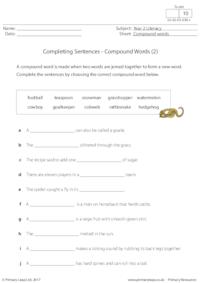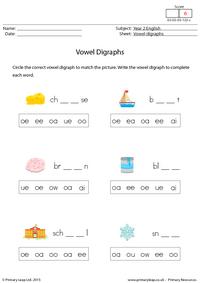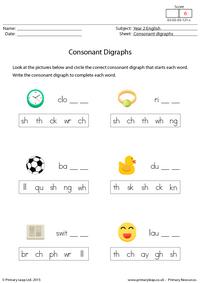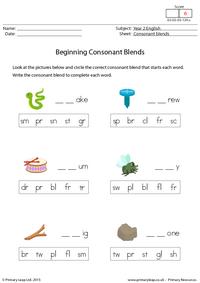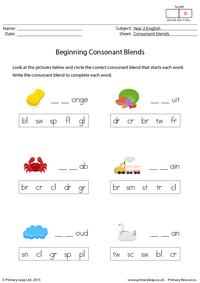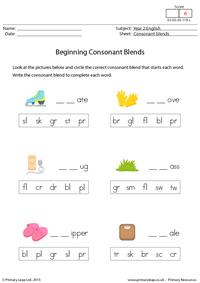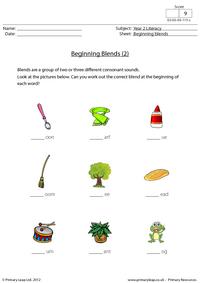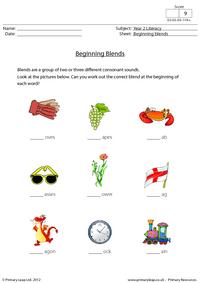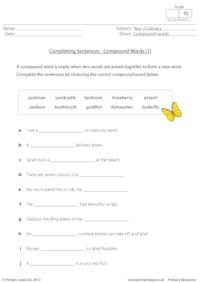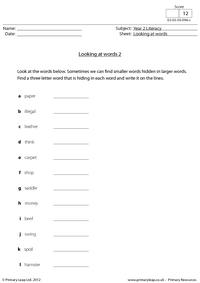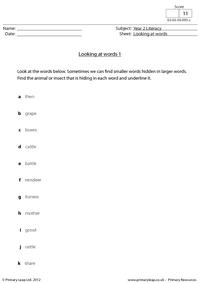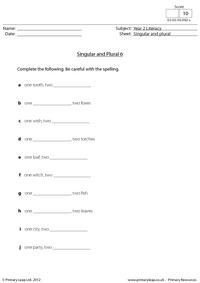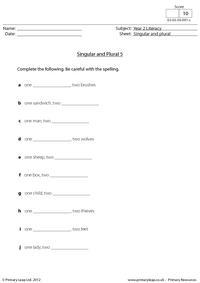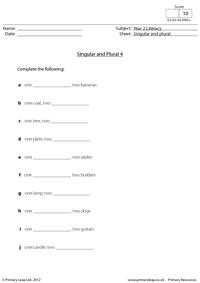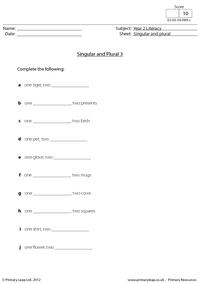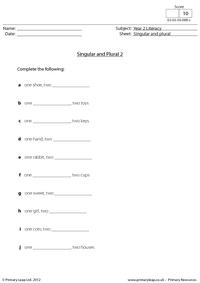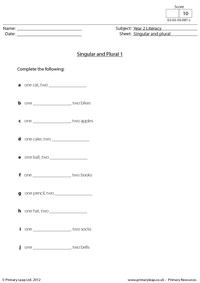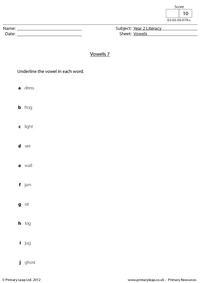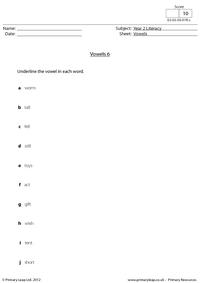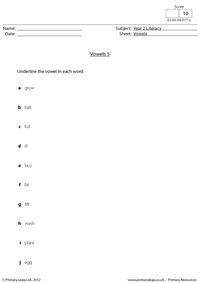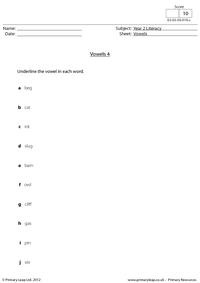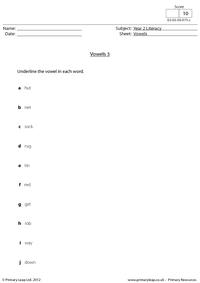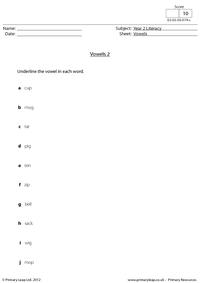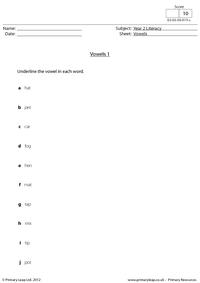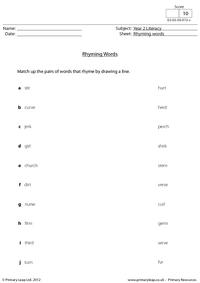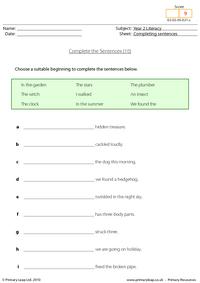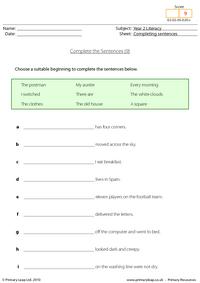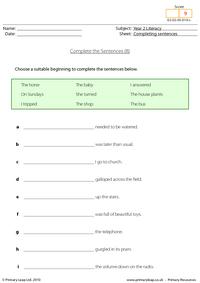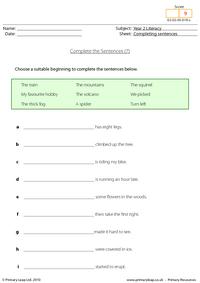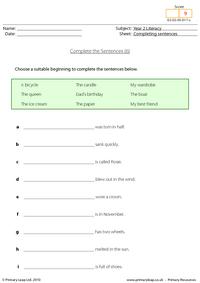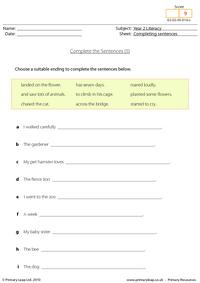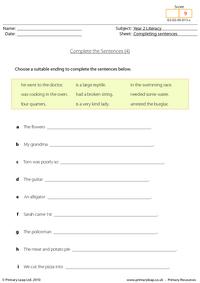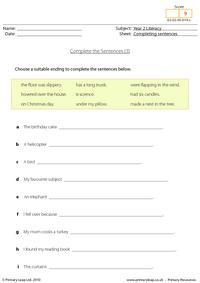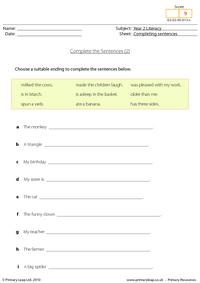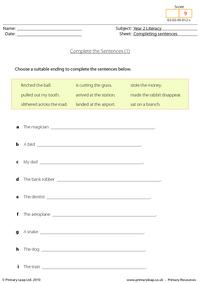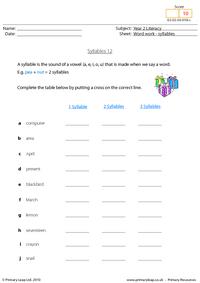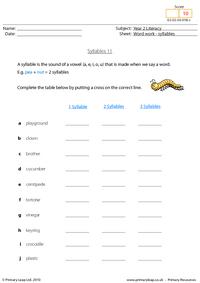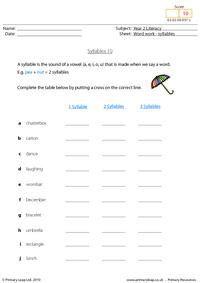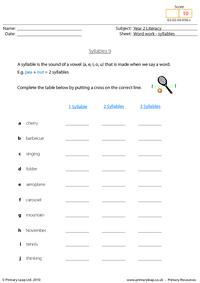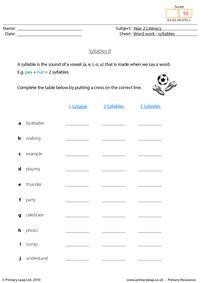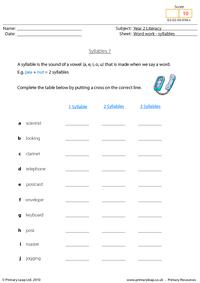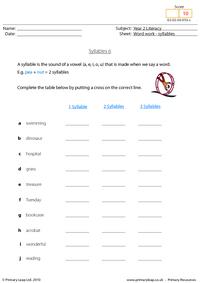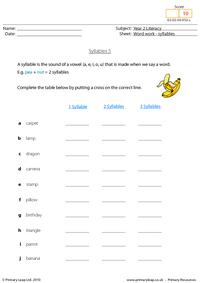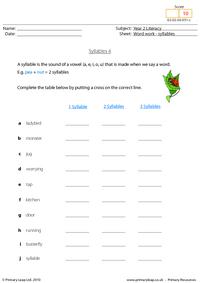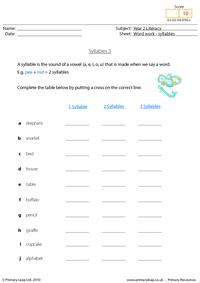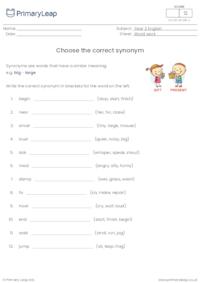96 results
Completing Sentences — Compound Words 2
Year 2 English — Compound words worksheet. Compound words are made when two words are joined together to make a new word. Students choose the correct compound word to complete the sentences.
Vowel Digraphs
Kids look at the pictures and circle the correct vowel digraph. They then write the vowel digraph to complete each word. This worksheet will help build a foundation for reading and spelling skills.
Consonant Digraphs
Kids look at the pictures and circle the correct consonant digraph that ends each word. Kids then write the consonant digraph to complete each word. This worksheet will help build a foundation for reading and spelling skills.
Beginning Consonant Blends (3)
Kids look at the pictures and circle the correct consonant blend that starts each word. Kids then write the consonant blend to complete each word. This worksheet will help build a foundation for reading and spelling skills.
Beginning Consonant Blends (2)
Kids look at the pictures and circle the correct consonant blend that starts each word. Kids then write the consonant blend to complete each word. This worksheet will help build a foundation for reading and spelling skills.
Beginning Consonant Blends
Look at the pictures and circle the correct consonant blend that starts each word. Write the consonant blend to complete each word.
Beginning blends (2)
Year 2 Literacy — Beginning blends. This worksheet helps children practice their blends. They must look at each picture/word and write the correct blend at the beginning of each word.
Beginning blends
Year 2 Literacy — Beginning blends. This worksheet helps children practice their blends. They must look at each picture/word and write the correct blend at the beginning of each word.
Completing Sentences — Compound Words 1
Year 2 English — Compound words worksheet. Compound words are made when two words are joined together to make a new word. Students choose the correct compound word to complete the sentences.
Completing sentences — compound words 1
Year 2 English — Compound words worksheet. Compound words are made when two words are joined together to make a new word. Students choose the correct compound word to complete the sentences.
Looking at words 2
Year 2 English — Look at words worksheet. Students look at the words and find a three letter word and underline it.
Looking at words 1
Year 2 English — Look at words worksheet. Students look at the words and find the animal hiding in each word and underline it.
Singular and plural (6)
Year 2 English — Singular and plural worksheet. In order to change a singular noun to its plural form, we normally add an s, but this is not always the case. This activity asks students to write the missing singular and plural words.
Singular and plural (5)
Year 2 English — Singular and plural worksheet. In order to change a singular noun to its plural form, we normally add an s, but this is not always the case. This activity asks students to write the missing singular and plural words.
Singular and plural (4)
Year 2 English — Singular and plural worksheet. In order to change a singular noun to its plural form, we normally add an s, but this is not always the case. This activity asks students to write the missing singular and plural words.
Singular and plural (3)
Year 2 English — Singular and plural worksheet. In order to change a singular noun to its plural form, we normally add an s, but this is not always the case. This activity asks students to write the missing singular and plural words.
Singular and plural (2)
Year 2 English — Singular and plural worksheet. In order to change a singular noun to its plural form, we normally add an s, but this is not always the case. This activity asks students to write the missing singular and plural words.
Singular and plural (1)
Year 2 English — Singular and plural worksheet. In order to change a singular noun to its plural form, we normally add an s, but this is not always the case. This activity asks students to write the missing singular and plural words.
Vowels (7)
Year 2 English — Vowels worksheet. A vowel is a letter representing such a sound as a, e, i, o and u. Students look at the words and underline the vowel in each word.
Vowels (6)
Year 2 English — Vowels worksheet. A vowel is a letter representing such a sound as a, e, i, o and u. Students look at the words and underline the vowel in each word.
Vowels (5)
Year 2 English — Vowels worksheet. A vowel is a letter representing such a sound as a, e, i, o and u. Students look at the words and underline the vowel in each word.
Vowels (4)
Year 2 English — Vowels worksheet. A vowel is a letter representing such a sound as a, e, i, o and u. Students look at the words and underline the vowel in each word.
Vowels (3)
Year 2 English — Vowels worksheet. A vowel is a letter representing such a sound as a, e, i, o and u. Students look at the words and underline the vowel in each word.
Vowels (2)
Year 2 English — Vowels worksheet. A vowel is a letter representing such a sound as a, e, i, o and u. Students look at the words and underline the vowel in each word.
Vowels (1)
Year 2 English — Vowels worksheet. A vowel is a letter representing such a sound as a, e, i, o and u. Students look at the words and underline the vowel in each word.
Rhyming words
Year 2 English — Rhyming words worksheet. This worksheet asks students to match up each rhyming pair by drawing a line.
Completing sentences (10)
Year 2 English — Sentence work. Sentence completion helps to improve a child’s skills in logic. Students look at the sentences and choose a suitable beginning to complete each sentence.
Completing sentences (9)
Year 2 English — Sentence work. Sentence completion helps to improve a child’s skills in logic. Students look at the sentences and choose a suitable beginning to complete each sentence.
Completing sentences (8)
Year 2 English — Sentence work. Sentence completion helps to improve a child’s skills in logic. Students look at the sentences and choose a suitable beginning to complete each sentence.
Completing sentences (7)
Year 2 English — Sentence work. Sentence completion helps to improve a child’s skills in logic. Students look at the sentences and choose a suitable beginning to complete each sentence.
Completing sentences (6)
Year 2 English — Sentence work. Sentence completion helps to improve a child’s skills in logic. Students look at the sentences and choose a suitable beginning to complete each sentence.
Completing sentences (5)
Year 2 English — Sentence work. Sentence completion helps to improve a child’s skills in logic. Students look at the sentences and choose a suitable ending to complete each sentence.
Completing sentences (4)
Year 2 English — Sentence work. Sentence completion helps to improve a child’s skills in logic. Students look at the sentences and choose a suitable ending to complete each sentence.
Completing sentences (3)
Year 2 English — Sentence work. Sentence completion helps to improve a child’s skills in logic. Students look at the sentences and choose a suitable ending to complete each sentence.
Completing sentences (2)
Year 2 English — Sentence work. Sentence completion helps to improve a child’s skills in logic. Students look at the sentences and choose a suitable ending to complete each sentence.
Completing sentences (1)
Year 2 English — Sentence work. Sentence completion helps to improve a child’s skills in logic. Students look at the sentences and choose a suitable ending to complete each sentence.
Syllables 12
Year 2 English — Syllables worksheet. A syllable is the sound of a vowel (a, e, i, o, u) that is created when the word is pronounced. Children should say the word, count how many syllables are in that word and put a cross on the correct line.
Syllables 11
Year 2 English — Syllables worksheet. A syllable is the sound of a vowel (a, e, i, o, u) that is created when the word is pronounced. Children should say the word, count how many syllables are in that word and put a cross on the correct line.
Syllables 10
Year 2 English — Syllables worksheet. A syllable is the sound of a vowel (a, e, i, o, u) that is created when the word is pronounced. Children should say the word, count how many syllables are in that word and put a cross on the correct line.
Syllables 9
Year 2 English — Syllables worksheet. A syllable is the sound of a vowel (a, e, i, o, u) that is created when the word is pronounced. Children should say the word, count how many syllables are in that word and put a cross on the correct line.
Syllables 8
Year 2 English — Syllables worksheet. A syllable is the sound of a vowel (a, e, i, o, u) that is created when the word is pronounced. Children should say the word, count how many syllables are in that word and put a cross on the correct line.
Syllables 7
Year 2 English — Syllables worksheet. A syllable is the sound of a vowel (a, e, i, o, u) that is created when the word is pronounced. Children should say the word, count how many syllables are in that word and put a cross on the correct line.
Syllables 6
Year 2 English — Syllables worksheet. A syllable is the sound of a vowel (a, e, i, o, u) that is created when the word is pronounced. Children should say the word, count how many syllables are in that word and put a cross on the correct line.
Syllables 5
Year 2 English — Syllables worksheet. A syllable is the sound of a vowel (a, e, i, o, u) that is created when the word is pronounced. Children should say the word, count how many syllables are in that word and put a cross on the correct line.
Syllables 4
Year 2 English — Syllables worksheet. A syllable is the sound of a vowel (a, e, i, o, u) that is created when the word is pronounced. Children should say the word, count how many syllables are in that word and put a cross on the correct line.
Syllables 3
Year 2 English — Syllables worksheet. A syllable is the sound of a vowel (a, e, i, o, u) that is created when the word is pronounced. Children should say the word, count how many syllables are in that word and put a cross on the correct line.
Choose the correct synonym
Year 2 English — Synonyms worksheet. A synonym is a word or phrase that means exactly or nearly the same as another word or phrase. Pupils are asked to find the correct synonym in brackets for the words on the left.




Reinforce key language skills with our year 2 English printable worksheets
We have hundreds of year 2 English worksheets that can be used at home or in the classroom. These worksheets will help reinforce your child’s language skills, expand their vocabulary and improve their punctuation and grammar.

Learn
One of the best things about printable worksheets is that they make learning fun and easy. Explore our educational resources based on Year 2 English and keep your children learning through these fun and engaging exercises.

Progress
Our Year 2 English printable worksheets are designed for progressive learning. Our engaging content enables a child to learn at their own speed and gain confidence quickly. When we help a child believe in themselves, we empower them for life.

Improve
Printable worksheets are a great way to enhance creativity and improve a child’s knowledge. Help your child learn more about Year 2 English with this great selection of worksheets designed to help children succeed.
Outstanding Resources for Outstanding Teachers.
For more quality products, please visit my website www.teachersvault.co.uk
Last updated
22 February 2018
Word Work — Year 2 Common Exception Words: A series of worksheets where children write, trace, identify, colour and unscramble decodable and tricky words. A fun activity to aid quick recognition of Year 2 Common Exception Words. Perfect as a registration activity, early finisher activity, homework or part of an English lesson.
This product is available for phonics phases 2-5 tricky and decodable words and Years 1 & 2 CEW.
For more Outstanding Resources for Outstanding Teachers, please visit my website www.teachersvault.co.uk
Something went wrong, please try again later.
Report this resourceto let us know if it violates our terms and conditions.
Our customer service team will review your report and will be in touch.
Last updated
22 February 2018
Outstanding Resources for Outstanding Teachers.
For more quality products, please visit my website www.teachersvault.co.uk
Not the right resource?
See other similar resources
Watch
Shop
Explore
When autocomplete results are available use up and down arrows to review and enter to select. Touch device users, explore by touch or with swipe gestures.
397
Pins
2y
Collection by
justine bead
Similar ideas popular now
Phonics
2nd Grade Ela
2nd Grade Writing
2nd Grade Reading
Third Grade
Guided Reading
Fourth Grade
Mentor Sentences
Sentence Writing
Mentor Texts
Collaboration Cuties: Freebie Mentor Sentence Lesson- Diary of a Spider
Vocabulary Strategies
Vocabulary Instruction
Teaching Vocabulary
Vocabulary Worksheets
Vocabulary Words
Vocabulary Journal
Vocabulary Games
Number Worksheets
Alphabet Worksheets
Quick and Easy Vocabulary Activity — Use It With Any Text! #Storyworks
Scholastic
Word work year 2
Vocabulary Activities
Teaching Literacy
Teaching Writing
Spelling Activities
Teaching Spanish
Phonics Rules
Phonics Lessons
Phonics Words
Jolly Phonics
Spelling Rules
Teaching Spelling
Teaching Phonics
Phonics Activities
Kindergarten Literacy
A Spot of Curriculum
Word work year 2
Multisensory Phonics
Reading Intervention
Reading Fluency
Reading Skills
Teaching Grammar
Phonics Worksheets
Learning Websites For Kids
Learning English For Kids
Lessons For Kids
Phonics Chart
Grade Spelling
Phonics Posters
Teaching Videos
Teaching Ela
Teaching Middle School
Language Teaching
Language Activities
Teaching Reading
Speech And Language
Teaching English
High School
Phonics Kindergarten
Literacy
Preschool
Reading Tutoring
Learning Phonics
Phonics Reading
Reading Intervention Classroom
Teaching Reading Comprehension
Teaching Strategies
Teaching Third Grade
Teaching Literature
Elementary Comprehension
Reading Strategies Middle School
Critical Reading Strategies
Comprehension Bookmarks
Online Reading Comprehension
Comprehension Strategies
Reading Resources
Reading Passages
Reading Strategies
Reading Activities
Reading Writing
Teacher Resources
Assign articles and research-based reading comprehension curriculum to your students at www.readworks.org, completely free.
Instructional Strategies
Teaching Resources
Marketing Strategies
Discussion Strategies
Discussion Starters
Siop Strategies
Learning Activities
Discussion Prompts
Learn Bright
Word work year 2
Teaching Comprehension
Teaching Tools
Teaching Metacognition
Metacognition Strategies
Thinking Strategies
Inferencing
School Activities
Kindergarten Reading
Grammar Activities
Teaching Language Arts
Classroom Language
Teaching Aids
Teaching Pronouns
Lucky Little Learners — Activities for 1st & 2nd Grade
Word work year 2
Writing Activities
Student Learning
Teaching French
Literacy Centers
Tricky Word Games
Tricky Words
Sight Word Games
Nursery Activities
Teaching Ideas
English Activities
Learning Letters
School Reading
Teaching Teachers
Eyfs Activities
Preschool Literacy
Early Literacy
Literacy Activities
Activities For Kids
Kindergarten
Phonics Cvc
Phonics Blends
Vanesa Wong
Word work year 2
Year 1 Classroom
Early Years Classroom
Reggio Classroom
Classroom Ideas
Play Based Learning
Primary Teaching
Primary Education
Phonics Games Year 1
Phase 5 Phonics
Phonics Display
Phonics Interventions
Brioney YoungB
Brioney Young
Word work year 2
Teaching Activities
Student Teaching
Writing Practice
Primary School
Reading Practice
Free Reading
Tooth Fairy Books
Elementary Music Room
Writing Units
Letter Writing
Writing Genres
Writing Tasks
3 Letter
Writing Workshop
Writing Ideas

Students learn to apply phonemic awareness skills to read simple three-sound words — ‘bat’, ‘hen’, ‘lock’. Simple and regularly occurring consonant digraphs — ‘ck’, ‘ll’, ‘ss’ — are introduced. The activity pages in each unit consolidate the acquisition of these basic reading skills. Blending skills are consolidated and refined as each vowel sound is introduced.
116 pages, Paperback
First published January 1, 2001
About the author
Join the discussion
Can’t find what you’re looking for?
Get help and learn more about the design.
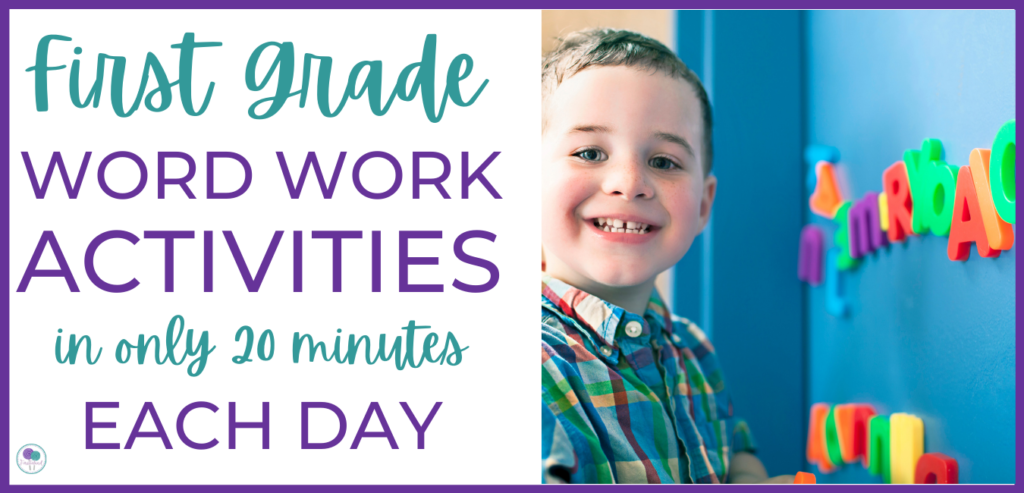
If you’re a 1st grade teacher, you know that trying to fit everything into your day can seem like an impossible task. First grade word work contains so many different skills!
There are high frequency words, phonics, phonemic awareness, spelling words and grammar. The list seems endless. Take a look at how I fit all of these skills into one easy lesson every day with our first grade word work activities.
What is word work?
We think of word work for first grade as learning about words in all different ways. Students may manipulate letters to build words, look at different phonics patterns, practice sounding out words, learn the patterns in different word families, memorize the spelling of different sight words or other high frequency words and even practice some grammar skills along the way.
Students can practice word work activities at your literacy centers, during writing instruction or independent learning time with a printable worksheet and even for homework. These are all great ideas for fitting word work into your day but we have a daily word study that combines phonics, grammar and high frequency words into one fun lesson.
First Grade Word Work Activities
Most students come to first grade with a letter/sound background. They usually recognize most of the letters and know that letters each make a specific sound. But learning to read is so much more than letters and sounds.
Students must learn that letters go together to form words. Words go together to form sentences. Sentences become paragraphs. Paragraphs go together to form a story.
In addition to all of that, students need to learn grammar rules too. Breaking this down for young children can seem daunting. Each skill builds upon the other, but where do you begin? And how do you fit everything into your day?
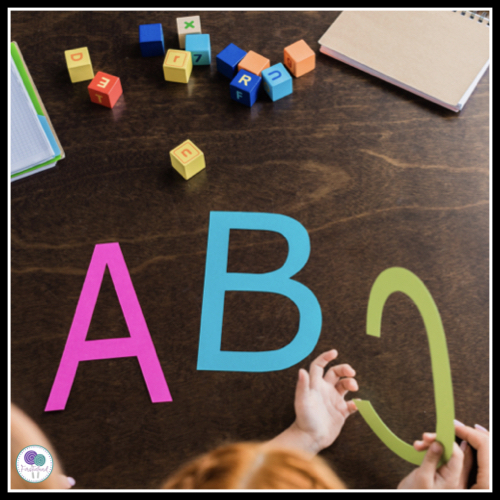
Fitting It All In
When I first started teaching first grade I wondered how I was ever going to fit everything into my day. I knew I needed to streamline my lessons but I didn’t want to leave anything out. All of the skills were important to teach my students how to read.
In our classroom, we use a program called the First Grade Word Study. This simple daily program is perfect for any first grade classroom, because it follows a standard first grade curriculum.
The First Grade Word Study is a year long program that contains 30 lessons. Each lesson includes 4 phonics, grammar and high frequency word activities for each week. All of the activities are contained on one slide for each day.
The slides can be projected onto your board in the front of the classroom. Using this one simple slide, your class can do a daily review of skills that include phonics, high frequency words, spelling and grammar.
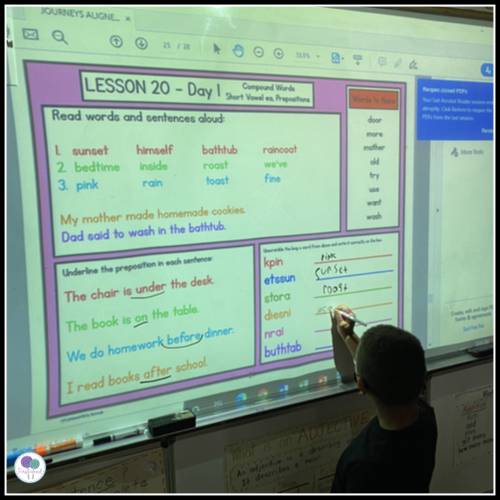
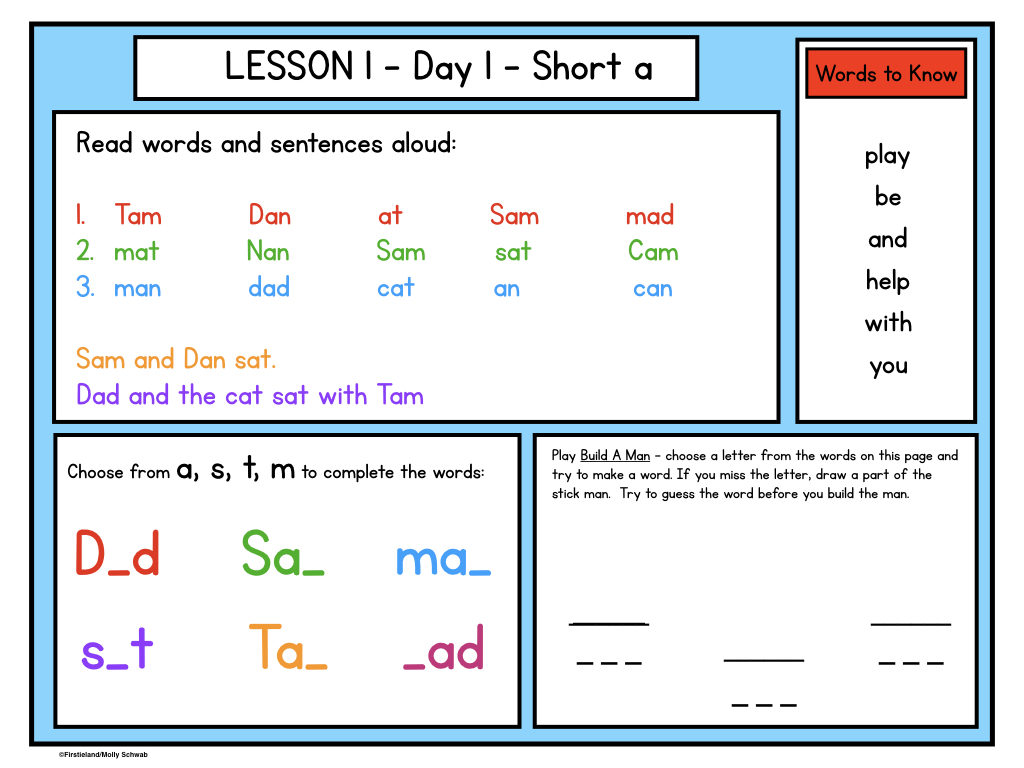
First Grade Phonics
We spend about 20 minutes each day doing our first grade word work. We begin the lesson with a review of our phonics skill for the week. The phonics skills on the word study begin in Lesson 1 with simple CVC words and increase in difficulty as the year progresses. Students practice reading words and sentences out loud.
In our classroom, I call on different students to come up and read a line of words out loud. This is great practice in sounding out words and gives the teacher the opportunity to reinforce letter sounds and how we blend the letters together to make words.
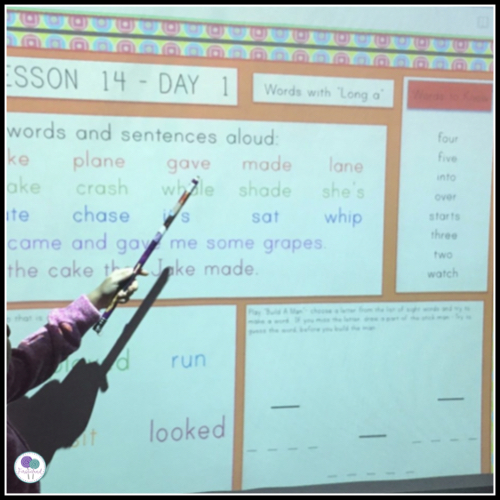
First Grade High Frequency Words
Next, we practice our high frequency words for the week. The first grade word study is editable so teachers can add whatever words their class is working on for the week. During this time, students will practice reading the words out loud and we’ll compare the words to see if any of them have similar qualities. I use this time to help students notice different blends, digraphs, endings, long vowels, and other phonics strategies in their high frequency words.
Sometimes we will play games with our words like Word Wars or Around the World where students will compete to see who can read or spell the word the fastest.
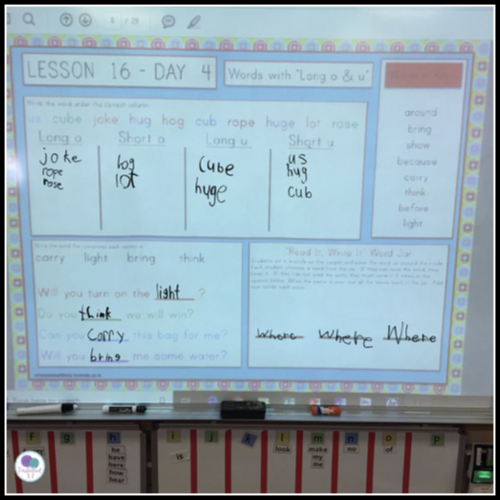
First Grade Grammar
During our first grade word work activities we also learn about grammar. Each week we introduce a new grammar skill such as nouns, verbs, adjectives, preposition, pronouns and more. The students learn how to use these grammar skills in sentences. The first grade word study includes a section for us to practice grammar skills each day.
Students can come up to the board and find nouns or verbs in sentences. Sometimes they will write the missing adjective in a sentence. The skills vary from week-to-week but follow a typical scope and sequence of the introduction of grammar skills in first grade.
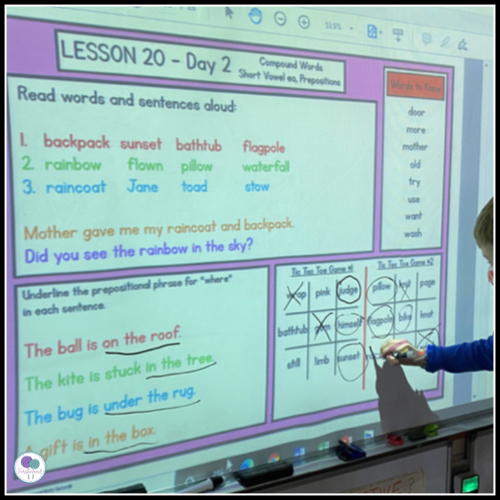
Word Work Games
Finally, we end the lesson with a reading or spelling game. The first grade word study has a daily game that the students love. The games are different each day and include things like Build A Man (similar to hangman but they are building a man instead), Tic Tac Toe, Read It Write It Word Jar and other games. Each game focuses on the phonics skill for that week and students look forward to playing each day.
Students Love the First Grade Word Study
My students actually look forward to our first grade word work. Each lesson is interactive, which gives the students a chance to come up and participate. Students use an expo marker to add letters to words, fill in missing words in sentences and play different word study games on our board.
I love using the word study because I can fit so many important skills into one short 20 minute lesson each day. If you use the Journeys reading series it is especially nice because it includes slides specific to that reading series. However, because it follows a typical phonics and grammar scope and sequence it works for any first grade classroom. The high frequency words are editable so teachers can add any words that they are using in their classroom.
Here’s what other teachers have to say about the First Grade Word Study
“Best purchase! I use these everyday. My students LOVE the tic tac toe and the unscrambling the words. Thank you for making this resource!” – Leah
“I use the daily practice slides 2-3 times a week (as often as my schedule allows). My students love when I use them. I appreciated the organized practice and review that is provided. My students love the variety in delivery. They particularly enjoy tic-tac-toe and the flashlight activities. Thank you for sharing! I have even had a couple of coworkers purchase this resource after seeing me use it with my class.” – Renee
“These are a GAME CHANGER! We adopted Journeys this year and I love it, but I’m also completely overwhelmed by all of it!! These slides are easy to use, clear for students, and help me hit several skills in one sitting. Thank you, thank you, thank you!” – Emily
“My students loved using this resource. It made learning the material hands on and fun for them. Thank you!” – Melissa
“This is my VERY favorite item to help squeeze in a quick 15 minute lesson that is just packed with worthwhile learning!” – Laura
“As a first year teacher this resource saved my life! I am able to fit it in under 20 minutes! My students know what to expect and I get full participation in class! Thank you!” – Andrea
“These activities can be used whole group on a Smart Board or printed and used for center time. My students enjoy the activities, and I love that they’re already planned out with clear explanations for me.” – Stephani
“I use this everyday in my classroom. The kids are thoroughly engaged and love to help fill in the blanks. Very practical. Very useful. Worth every cent.” – Amanda
If you’re struggling to fit everything into your day, and want a resource that packs a punch in your daily word study activities, this just may be the answer you’ve been searching for. It’s a great way to teach all your skills in a quick, easy and fun daily lesson! Take a closer look at this resource here.

Please follow and like us:

